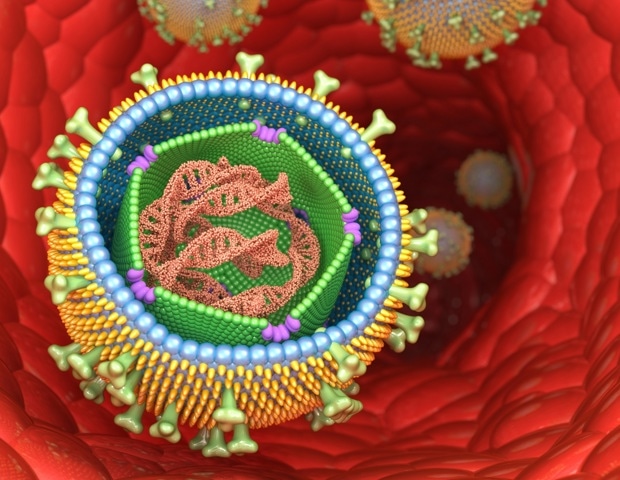The body’s immune response to Epstein-Barr virus (EBV) may play a role in causing damage in multiple sclerosis patients, a new study led by the National Academy of Sciences has found. UT Health Houston.
Although EBV infection has long been associated with multiple sclerosis, it has not been clear how the infection contributes to the disease. More than 95% of people are infected with this widespread virus. However, it usually remains in the latent stage and does not cause any problems. However, in some cases, T cells specific for EBV infection can cause problems.
Current research led by first author asaf gottliebPh.D., assistant professor in the Center for Precision Health in the McWilliams School of Biomedical Informatics at UTHealth Houston and senior author. J. William LindsayM.D., professor of neurology at UT Health Houston’s McGovern School of Medicine, demonstrated the presence of large numbers of T cells specific for EBV-infected cells in the cerebrospinal fluid of patients in the early stages of multiple sclerosis. .
The study was published in the journal Proceedings of the National Academy of Sciences.
The researchers collected blood and cerebrospinal fluid samples from eight patients during the process of diagnosing multiple sclerosis. The researchers tested cells from a patient’s own blood with multiple different stimuli, including EBV-infected lymphoblastoid cell lines (LCLs) from the same person, cell-free EBV, varicella-zoster virus (varicella), influenza virus, and Candida. stimulated. They then used T cell receptor RNA sequencing to determine which stimuli the cerebrospinal fluid T cells were responding to.
“We saw a clear signal that LCL-specific T cells were enriched in the cerebrospinal fluid of patients with multiple sclerosis,” said University of Texas MD Anderson Cancer Center, UT Health Houston Biomedical Sciences. said Gottlieb, who is also a faculty member at the graduate school. Science. “This pattern is very different from that observed in other neurological diseases, suggesting it is unique to multiple sclerosis.”
On average, 13% of T cells in the cerebrospinal fluid of people with first symptoms of multiple sclerosis are specific for EBV-infected autologous B lymphocytes, indicating a link between EBV and multiple sclerosis. It shows a clear connection.
In the most proliferated cerebrospinal fluid clone, which is likely involved in the development of multiple sclerosis, the abundance of LCL-specific T lymphocytes is even higher, at 47%.
T cells from three other common infections did not show similar abundance in the cerebrospinal fluid.
“This study shows that LCL-specific T cells are present in the cerebrospinal fluid early in the disease process,” said Lindsey, Opal C. Rankin Professor of Neurology at the School of Medicine. . “This strongly suggests that these T cells are causing disease or contributing to disease in some way. Experiments are underway.”
EBV is a type of herpesvirus that is most commonly spread through body fluids, especially saliva, and can cause illnesses such as infectious mononucleosis.
According to the World Health Organization, multiple sclerosis is a chronic disease of the central nervous system that affects more than 1.8 million people worldwide. Symptoms vary greatly from patient to patient, but some people with severe multiple sclerosis lose the ability to walk independently. There is no cure for this disease.
Co-authors include H. Phuong T. Pham, Ph.D., formerly of the Department of Neurology at McGovern Medical School and now at the University of Texas at Dallas, and Jerome G. Saltarrelli, Ph.D., Ph.D. School surgery. This research was funded by the Opal C. Rankin Professorship in Neurology and his pilot grant from UTHealth Houston.
sauce:
Reference magazines:

